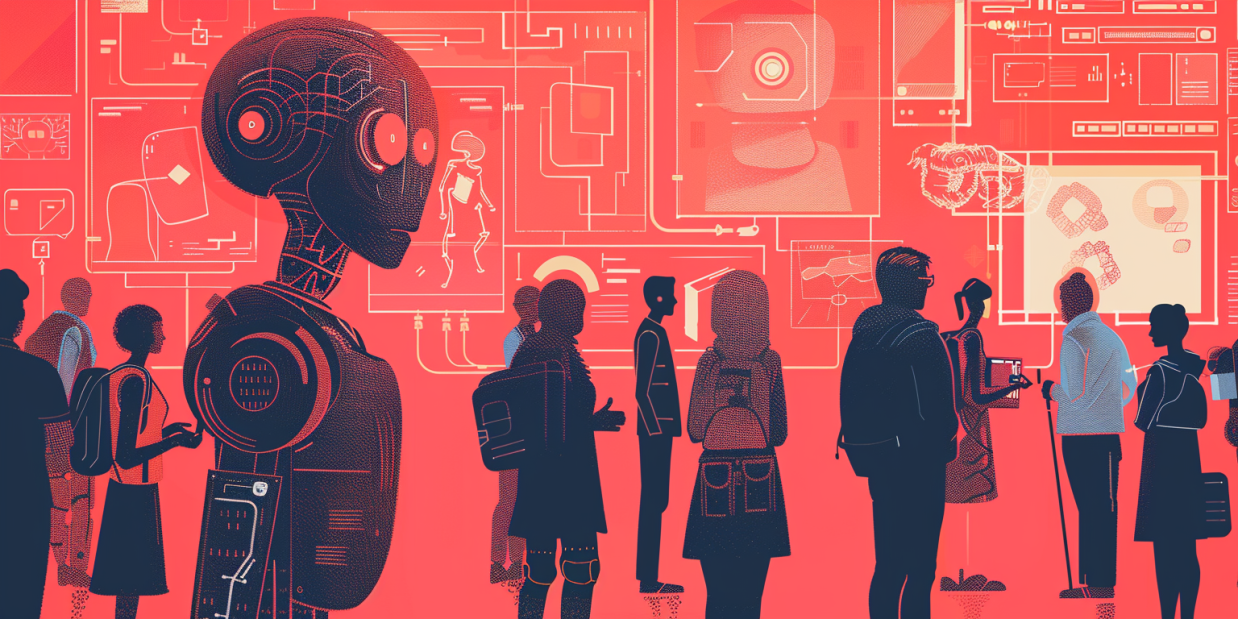The Rise of AI: Threat or Opportunity for the Job Market?
AI is revolutionizing employment, disrupting and growing sectors. Discover its impact on healthcare, finance, education, and retail. Navigate the challenges, harness its potential, and embrace the opportunity to shape the future of work.
Get referred to your dream company
Sections
In the rapidly evolving digital era, Artificial Intelligence (AI) has become a buzzword synonymous with both innovation and controversy. As AI technologies weave into the fabric of various industries, questions about their impact on the job market have become increasingly prevalent. Is AI a looming threat that will lead to mass unemployment, or is it an opportunity to foster new types of employment and productivity? This blog post explores how AI is reshaping employment landscapes across different sectors, highlighting its dual role as both a potential disruptor and a catalyst for growth.
The Disruptive Force of AI
There's no denying the disruptive potential of AI on traditional job roles. Automation, powered by AI, has already shown its capacity to perform tasks ranging from routine data entry to complex analytical work, often with greater efficiency and fewer errors than human counterparts. Sectors such as manufacturing, transportation, and customer service are witnessing a paradigm shift as machines and software algorithms undertake tasks once performed by humans. According to a report by the World Economic Forum, 85 million jobs could be displaced by machines with AI capabilities by 2025.
However, it's crucial to recognize that this disruption is not merely about job loss; it's about transformation. The automation of repetitive and labor-intensive tasks frees human workers to focus on more complex, creative, and strategic activities that AI cannot easily replicate.
AI as a Catalyst for New Opportunities
The advent of AI is not just a narrative of displacement but also one of creation. The same World Economic Forum report suggests that AI could generate 97 million new roles across sectors by 2025. These roles emerge as businesses and economies adapt to the new technology, creating demand for jobs in AI development, data analysis, cybersecurity, and more. Furthermore, AI is driving innovation in fields such as healthcare, education, and environmental science, leading to new career paths that were previously unimaginable.
Sector-Specific Impacts
Healthcare:
AI is revolutionizing healthcare through predictive analytics, personalized medicine, and robotic surgery, creating a demand for AI specialists, bioinformatics scientists, and telemedicine coordinators.
Finance:
In finance, AI algorithms improve fraud detection, customer service, and financial advising, necessitating roles like AI risk managers and algorithmic traders.
Education:
AI-powered personalized learning and virtual classrooms are transforming education, leading to opportunities for educational software developers and AI integration specialists.
Retail:
E-commerce and brick-and-mortar stores alike benefit from AI in inventory management, customer experience, and personalization, driving the need for AI retail analysts and customer experience managers.
Navigating the Challenges
While the opportunities are vast, realizing them requires navigating several challenges. Education and training systems must evolve to equip the workforce with the skills needed for tomorrow's job market. This entails not only technical skills related to AI and data science but also soft skills like problem-solving, creativity, and emotional intelligence that are essential in an AI-driven world.
Moreover, businesses and policymakers must work together to ensure that the transition towards an AI-centric job market is inclusive and equitable. This involves implementing strategies to mitigate the impact on workers displaced by AI, through retraining programs and social safety nets, and fostering a culture of lifelong learning.
Conclusion
The rise of AI in the job market presents both a threat and an opportunity. While automation poses a significant challenge to traditional job roles, AI also drives the creation of new opportunities and industries. By embracing this duality, focusing on education, and fostering collaboration between the private sector and policymakers, we can navigate the AI revolution to harness its full potential. The future of work in an AI-driven world is not predetermined—it's ours to shape.
In the dialogue about AI's impact on employment, it's essential to move beyond binary thinking. Rather than viewing AI as a threat or savior, recognizing its role as both disruptor and innovator offers a more nuanced understanding. This perspective enables us to proactively address the challenges while seizing the opportunities to create a more dynamic, resilient, and inclusive job market.
Embracing AI's potential will require adaptability, foresight, and concerted effort across all sectors of society. However, with the right strategies in place, the rise of AI could mark the beginning of a new era of productivity, innovation, and employment opportunities. The question isn't whether AI will replace jobs, but rather, how we will leverage AI to redefine them.
Your career is worth investing in.
Get unlimited referrals with Premium.
Community
© 2025 Crucible Fund LLC. All rights reserved.
